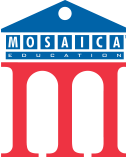TEAM MOSAICA NEWS – VOLUME 95
We live in an increasingly polarized and toxic environment – and I’m not talking about the drilling rig explosion that has spewed millions of gallons of oil into the Gulf of Mexico. We see the venom most clearly in politics. Newt Gingrich, former Speaker of the House, hypes book sales by saying the current Administration represents “as great a threat to America as Nazi Germany or the Soviet Union.” [And he was a history professor with a Ph.D. in Modern European History, so he presumably comprehends how serious those two threats were.] Last summer’s town hall meetings frequently disintegrated into near brawls, and it seems you can’t watch a Tea Party without seeing a poster comparing President Obama to Adolph Hitler (or worse). Some Republicans shout down the President when he is addressing Congress, while others have not only embraced the epithet of the “Party of No”; they say they want to be known as the “Party of Hell No.”
But it’s not just the far right fighting a Democratic administration. Politicians like Evan Bayh have decided to retire because of what they see as an overall loss of civility in Washington. Others have been involuntarily retired, reflecting voter anger and anti-incumbent fervor that is running high – and being vented. After 45 years in elective politics, including 30 years in the Senate, Arlen Specter lost his primary in Pennsylvania by 20 percentage points. In Utah, Senator Robert Bennett, an 18-year veteran seeking a fourth term, was voted off the ballot at the Republican state convention. Senator Specter had switched parties because he feared he would lose a Republican primary, and thus his loss may be hard to accurately deconstruct. But Senator Bennett had received an enthusiastic endorsement from Mitt Romney, a local hero in Utah, and is in his own right one of the most conservative members of the U.S. Senate, with a deep political pedigree, strong Mormon roots and a history of public service. That Utah Republicans found him too liberal and too willing to work with Democrats shows how extreme politics has become.
There’s a related phenomenon in education. The NewSchools Venture Fund conducted an Oxford-style debate at its summit over the question whether educational entrepreneurs should partner with school districts and/or state departments of education. I observed that the format contributed to a perception that the issue had but two sides, with no possibility of compromise. [I also pointed out that Chris Whittle, founder of what is now called Edison Learning, used to answer that question by pointing out that nobody asked Fred Smith why he founded FedEx instead of fixing the Post Office.]
In education, people seem to squabble about everything. They argue over whole language vs. phonetic approaches to teaching language arts; whether we should “teach to the test” or abandon all accountability and standards; which are better: charter schools or government schools; if schools should concern themselves solely with providing the best education possible, or should deal with the needs of the whole child; and, whatever we decide with respect to that question, should schools teach critical thinking and analytical skills or focus on making sure students learn a vocabulary of common information, facts, stories and skills that make up a shared cultural literacy, etc., etc., etc. In every one of those “debates,” one side or the other frequently seeks to demean and demonize the other. Instead of trying to understand the merits of the argument or to identify an intellectually sound compromise that accommodates both positions, both sets of proponents tend to dig in their heels, scream louder, pound on the table and hurl invective. (You should see some of the responses to Team Mosaica News.)
The reality, of course, is that all of those arguments are false dichotomies, a logical fallacy in which only two alternatives are considered – also sometimes referred to as the “missing middle” or the “bogus dilemma” – whereas the “right answer” could be both, neither, or somewhere in between. Indeed, the last false dichotomy I cited, whether the principal purpose of education was to develop critical thinking skills or a shared core of knowledge, was part of Dawn Eidelman’s inspiration for the Paragon curriculum. At the time, two prominent university professors, Howard Gardner from Harvard and E.D. Hirsch from the University of Virginia, were publicly debating each other on that subject, and their acolytes and supporters were carrying on the discussion in evermore strident terms. Dr. Gardner, best-known for his theory of multiple intelligences, argued that schools should focus on teaching students how to think – like, say, a scientist or an artist or a historian – in order to develop sound thinking on essential questions. Dr. Hirsch countered that that type of “progressive education” had failed students, particularly disadvantaged ones, and that a school combining drill and practice with a demanding core curriculum would produce the most successes. Dr. Eidelman saw that as a false dichotomy, and she developed Paragon and the rest of Mosaica’s Education Program to accommodate both scholars’ viewpoints into a lovely mosaic that has served us, our students and their families well over the past 13 years.
My point is not to diminish the passion behind our political disputes or our educational discussions. Healthy debate is good for the soul in both quarters, and when done properly should inform the electorate and benefit the children. But we need to conduct our debates without rancor and with civility and good humor, aiming toward a goal of generating more light than heat. And if you don’t understand that, you’re an idiot. (I’m obviously just kidding with that sentence – at least I hope it was obvious – but see what I mean?)
Enjoy your Memorial Day, as we remember and honor those who gave their lives in service to our country.
Michael J. Connelly
Chief Executive Officer
Mosaica Education, Inc.



